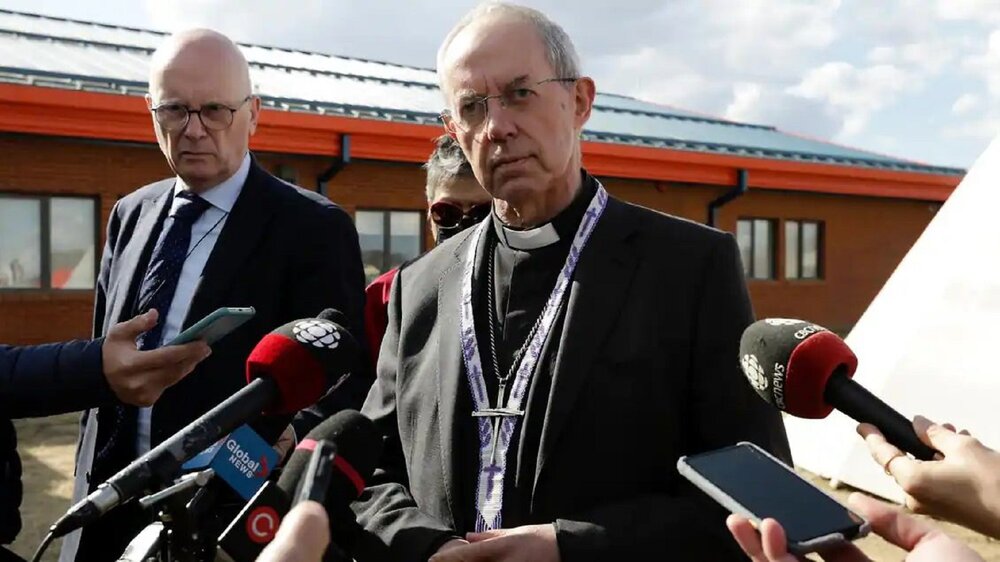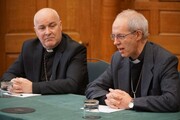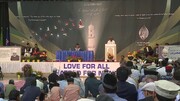Hawzah News Agency – The Archbishop of Canterbury says his apology for the "terrible crime" the Anglican Church allowed at residential schools will be followed by action — but it's unclear whether that will include any of the Church of England's estimated assets of $13 billion Cdn.
"I don't run it. I can't just go home and write a cheque," Rev. Justin Welby told reporters Saturday after hearing emotional stories from survivors at the James Smith Cree Nation, located 200 kilometres northeast of Saskatoon. Welby is the religious leader of the Church of England, but its head is the British monarch.
Saturday afternoon, Welby apologized for the church allowing and turning a blind eye to "hell" for so many Indigenous children for more than a century. He promised to take action.
"I am sorry. I am more sorry than I can say. I am ashamed. I am horrified," he said.
Welby hears from more survivors Sunday
Welby spent Sunday in Prince Albert, Sask. holding mass and then hearing from more survivors. A small group of roughly 20 survivors were able to attend. Some said they heard informally at the last second from Facebook friends.
Survivor Samuel Hardlotte of La Ronge said hundreds of Anglican school survivors from across Saskatchewan or other parts of Canada would have attended if they'd been given proper notice. He said many of them have waited years to hear an apology and to demand action from the top official.
"It doesn't feel good. We're always the last ones to hear about these things. A lot of things happened to us and we wanted to share it. A lot of people back home didn't know until it was too late today," Hardlotte said.
Those who did share from the podium Sunday recounted details of rampant abuse and deprivations.
"We were taught for years that we were the children of the devil. I was ashamed. I walked with my head down. I lost my language. For years I was terrified of white people. Terrified," one elderly woman said.
George Merasty, a survivor who also works to support survivors through the Prince Albert Grand Council, said that when he heard the apology, he thought of all his friends who died before they could hear it.
Merasty hopes Welby offers supports "for those that are still out there dealing with this trauma, as well as the young people. I feel for them. We need dollars to heal. We are losing so many because of residential school."
Former Federation of Sovereign Indigenous Nations Chief Sol Sanderson told Welby that if the Anglican Church cares about justice and equality, it must now follow the direction of First Nations people.
"That apology doesn't go far enough...We have inherent rights, inherent sovereignty. So our duty, if we want to make changes, is to define them through our own customs, our own languages," Sanderson said.
The compensation question
This week, Saskatoon Cree lawyer and former Truth and Reconciliation Commission general counsel Donald Worme said his research with the commission indicated total assets of the Church of England to be at least $13 billion Cdn. That includes more than 42,000 hectares of real estate in Great Britain alone, much of it in the highest-priced districts of London.
The Anglican Church of Canada paid out $15 million in compensation under a 2006 agreement to settle billions in lawsuits, but then got a refund of $2.8 million after the Roman Catholic Church negotiated a side deal, altering the formula. The Anglican Church of Canada said it invested the refund into Indigenous ministry programs.
Worme and survivors say the compensation may have been legal, but it was paltry and wrong, considering the devastation imposed on 150,000 survivors and their descendants. The Anglican Church ran roughly three dozen residential schools in Canada and more than 150 Indian day schools.
Welby called the compensation a "significant contribution" because the Canadian branch of the Church is not rich.
Welby said Worme's $13-billion estimate is "not entirely accurate," but then admitted the amount of wealth controlled by the Church's commissioners is "around that."
Hopes to take action in coming months
Welby said much of it is tied up in pension funds, legal requirements and roughly 15,000 trust accounts "which also makes life a bit difficult."
He said they hope to take action in the coming months on commemoration and other educational issues, but talk of any compensation "is going to take longer because the legal complications are indescribable."
Welby also said survivors in Canada are not the only consideration: he noted the Anglican Church and other religious institutions have harmed Indigenous communities in the Caribbean, Australia and elsewhere.
He said there are also 3.6 million families in the United Kingdom that get food assistance from churches.
Welby said he'd like to work with survivors before deciding on any further action.
"Surely, we can learn to work with people and not do things to them," he said.
A 'cultural genocide'
When asked for a timeline on his action plan, Welby said the COVID-19 pandemic has taught him not to set deadlines. But he said he hopes to have something regarding general education and recognition by August.
Welby agreed with the TRC's characterization of the school system as a "cultural genocide."
"I can understand why many survivors would feel in may ways that this was an actual genocide," he said.
Welby is expected to head to Toronto next for an event on Monday.
Survivor Tom Roberts said the apology was moving, but he intends to hold Welby to his promise of action. For Roberts, that must include financial help for healing centres and other supports. And he said it must happen immediately because the number of survivors is rapidly dwindling.
Third-generation residential school survivor Rhonda Sanderson says she accepts the apology she witnessed Saturday from Welby, but she's also heard one broken promise after another from all the churches and government.
"Today was a monumental day. To hear those words, it had a huge impact on me," she said. "Put your words into action. Don't just say it and not do anything. That would be frustrating."





Your Comment